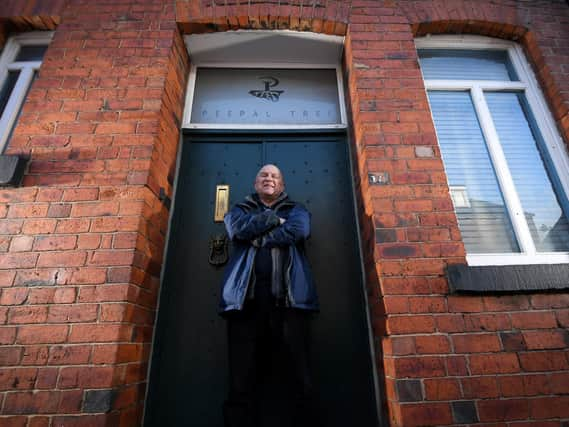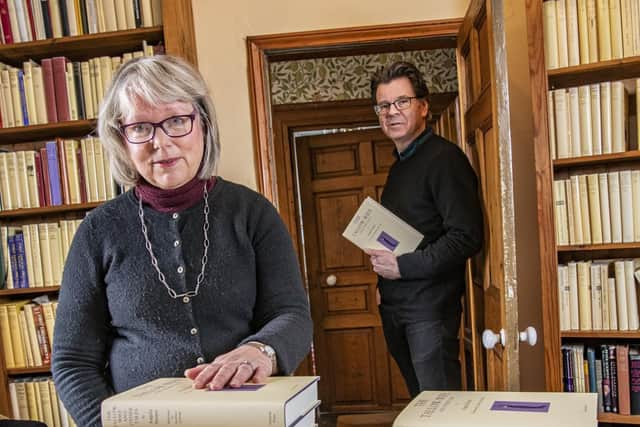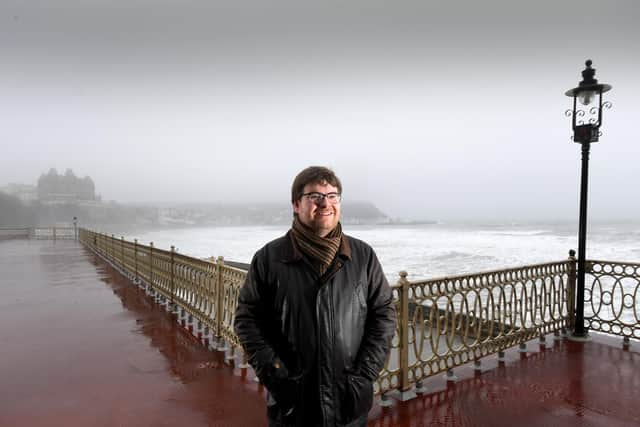Meet Yorkshire's independent book publishers taking the big guns on at their own game


However, while the end of terrace property lacks a little in glamour, it does have other things in its favour. The rent is cheap, according to founder Jeremy Poynting you can’t beat the fish masala served up by the curry house across the road, and besides when you are responsible for the book which recently scooped the Costa Book of the Year no one much cares about the surroundings.
“The phone hasn’t stopped,” says Poynting, who was sent a manuscript of Monique Roffey’s The Mermaid of Black Conch in 2018 after it had been rejected by many big name publishers.
Advertisement
Hide AdAdvertisement
Hide Ad"We never judge a book on how successful it will be commercially, I’m not sure that’s even possible to do. However, occasionally you get a manuscript which is brilliantly written, tells an interesting story and which you sense will have wide appeal.


"That was definitely true of Monique’s novel. Yes, of course it would have been good to win in a year when we could have attended a nice champagne reception. You know what, we’ll take it.
“Normally we print around 2,000 copies of a new book, but we’ve just pressed go on one for 10 times that for Mermaid. Like it or not, prizes make a big difference to a small publishing house like us.”
Founded in 1985, Peepal Tree Press was born in the ruins of a Caribbean sugar estate when Poynting saw a friend acting out various stories he’d tried and failed to get published.
Advertisement
Hide AdAdvertisement
Hide AdBelieving they deserved a wider audience, Poynting, who had first fallen in love with the region’s literature as a Leeds University student in the 1960s, promised he would organise a small print run when he got home to England.


True to his word, Backdam People by Rooplall Monar became the first book to be published under the Peepal Tree Press banner. Taking its name from a tree believed to have been brought to the Caribbean from India (Poynting liked the idea of something putting down roots elsewhere), it was printed at night on the college presses where he worked at the time and they were delivered by hand to various bookshops.
Today, the publisher’s back catalogue boasts 300 titles and with a continued commitment to literature by Caribbean writers and the diaspora it is now one of Arts Council’s national portfolio organisations. That guarantee of regular funding means Poynting is no longer a one-man band, but some things, not least the lack of a hefty marketing budget, haven’t changed.
“I knew there wouldn’t be much money swilling around,” says Trinidadian-born Roffey, who used crowdfunding to pay for her own publicist to promote The Mermaid of Black Conch.
Advertisement
Hide AdAdvertisement
Hide Ad“The truth is, my agent took the novel to the big publishers and no one wanted it, so we began to look at the independent sector. Peepal Tree has a great reputation and as soon as I spoke to them it didn’t feel like a second best option, but exactly the right place for this book to be brought into the world.
“When I suggested crowdfunding I thought they might be offended, but they just said, ‘go for it’. I guess that’s one of the advantages of going with a smaller publisher. They might not have deep pockets but you also have a greater sense of control. You don’t write to win awards, but the Costa has been great for both of us; I feel like I am drowning under a tsunami of goodwill.”
Like Poynting, Stefan Tobler learnt early on the difference a major award can make to the fortunes of an independent publishing house. He launched Sheffield-based And Other Stories during the credit crunch of 2008 and admits that the shortlisting of Deborah Levy’s novel Swimming Home for the 2012 Booker Prize gave it some much needed financial security.
“Every independent publisher needs a bit of luck to survive in the early years and that was ours,” says Tobler, who has temporarily decamped from his base in the city’s Central Library to an office at home.
Advertisement
Hide AdAdvertisement
Hide Ad“I started And Other Stories in an act of frustration. I had lived abroad for a while and realised how many publishers were unwilling to take a risk on works in translation. I intended it to be a hobby but quite quickly I realised if I was going to do it properly it was a full-time job.”
Run on a subscription model where readers can sign up to receive two, four or six books a year, And Other Stories has grown into the biggest fiction subscription service in the UK and Tobler has recently expanded the company’s US presence.
“We now have 1,600 subscribers paying between £22 and £55 a year and that reliable income stream allows us to do what we do,” he says. “We have put a lot of time into growing our American audience. We already had a contributing editor based in New York and a publicist, but we have now taken on another senior editor as well as a trade marketing director.
“This year has been an interesting one for all of us, but in many ways I think independent publishers were probably more adept at coping in these strange times than many bigger outfits.
Advertisement
Hide AdAdvertisement
Hide Ad“We are used to wearing many hats and doing a lot with little. Yes, I am the founder, but I’m also the guy who every Thursday fills the mail bags with that week’s orders and that’s just fine.”
Lockdown has also given Jamie McGarry, of Scarborough-based Valley Press, the chance for a rethink. The publishing house, which has built a reputation as a poetry specialist since it launched in 2008, has recently taken on two editors at large who will act as literary talent spotters.
“A few years ago I launched the Lendal Press imprint with the idea of giving editors the chance to publish new work by writers they admired,” says McGarry. “It was great and it made me realise the benefits of having other people on board. Having a pair of editors at large who have their own connections and their own tastes is about us broadening our horizons.”
While McGarry’s books haven’t yet won any of the big prizes, collections by the likes of the late Helen Cadbury have earned critical acclaim and every one of the 150 or so books he has published to date is a vindication of his venture.
Advertisement
Hide AdAdvertisement
Hide Ad“I tried everything to get a job in publishing, but failed,” he says. “The final straw was when a WH Smiths opened opposite my mum’s house in Driffield. There were nine positions and I didn’t even get an interview.
"At that point I thought, ‘Right, if no one else will give me a job I’ll have to create one for myself’. I’d been making books ever since I was a child, so no one was particularly surprised when I said I was launching Valley Press, but I was lucky with the timing. Back then there was a government scheme which meant you could claim Jobseekers Allowance for four months while you tried to set up your own business. I couldn’t have done it without that.”
While publishers like Hebden Bridge-based Bluemoose Books, which recently scored a word of mouth hit with Leonard and Hungry Paul by Irish writer Rónán Hession which has been chosen as the book every Dubliner should read this year, publish across literary genres, others have found success by carving a niche.
Ray Russell and his partner Rosalie Parker are the brains behind Tartarus Press, which began in 1990 publishing classic supernatural fiction by the likes of Welsh author and mystic Arthur Machen, who Stephen King has cited as an inspiration.
Advertisement
Hide AdAdvertisement
Hide AdBased from their home in Coverdale in the Yorkshire Dales, they now also work with contemporary writers whose work fits the supernatural brief, but their approach to publishing is unapologetically old school.
“We only announce a new book a couple of days before it is published, that way it is fresh in people’s minds,” says Russell, who in the early years combined the publishing venture with being a house husband. “Our cover art also always follows a similar design, so every book feels like it’s part of a collection.”
The Loney by Andrew Michael Hurley has been far and away Tartarus’ biggest hit. Set in Morecambe and described by the author as “a dark version of the nativity”, it won the First Book Award at the 2015 Costas and secured Hurley, who also sold the film rights, a major book deal. Tartarus though published an initial limited edition run of just 350 copies.
“Some people would describe us as small, but I prefer to say boutique,” adds Russell. “When Andrew got taken on by John Murray we were really pleased. Their marketing budget involves massive posters on the London Underground; that kind of exposure is something we could never offer.
“What we do have though is a direct relationship with our customer. Tartarus isn’t just a publishing house, it’s a community.”